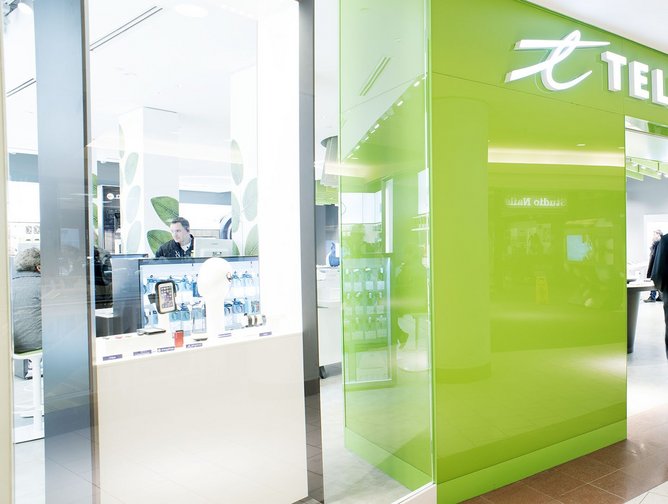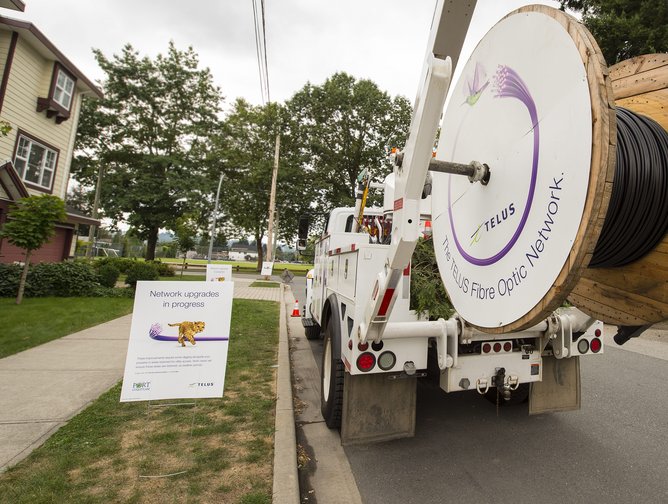“I found out that if you are going to win games, you had better be ready to adapt,” is a famous quote from record-breaking Canadian ice hockey coach, Scotty Bowman. These words resonate as much in the telco industry today as they do in sports, with one of Canada’s leading communication and IT companies, TELUS, working to ensure they remain agile to the needs of their 16m customers from the Atlantic to British Columbia.
This is no mean feat for TELUS when you consider the world’s second largest country covering 9.98 million square kilometres. In 2020 TELUS was recognised as the fastest wireless network in the world. The company reports CAN$16 billion in annual revenue.
In a country that stretches from the Atlantic to the Pacific, the focus on sustainability is paramount. TELUS reinvests 5% of its profits back into communities, connecting Canadians in need and committing to become a zero-waste, carbon neutral company by 2030 and working “to make the future friendly, together”. TELUS was named the most giving company in the world, leveraging its world-leading technology and compassion to drive social change and enable remarkable human outcomes.
By the end of the year, more than 70% of the Canadian population will experience TELUS’ fast 5G network, providing speeds up to 1.7 Gbps. It is estimated 5G will create 250,000 jobs and contribute CAN$150 billion to Canada’s economy over the next 20 years, which could be key to Canada’s fiscal recovery.
“If I were to summarise what TELUS offers in one word, I would say connectivity,” said Ali Tizghadam, Principal Technology Architect/Network Softwarisation Lead at TELUS, who is keen to discuss how network softwarisation and cloudification is shaping the company’s digital strategy.
“The meaning of connectivity has evolved within the industry from a simple physical connectivity to a connectivity in the context of connected societies and connected citizens,'' commented Tizghadam. “That's why TELUS is also offering services such as technology solutions for agriculture and health, smart cities, Internet of Things (IoT) and network slicing. Connectivity should now be considered part of Maslow’s Hierarchy of human needs along with food and shelter and that is our focus at TELUS to ensure those in need are all connected.”
Nazim Benhadid, VP of Network Infrastructure and Virtualization at TELUS, said: "Digital transformation and automation opens a world of possibilities which, combined with our strong culture and the commitment of our team members, allows us to spearhead innovation and deliver exceptional outcomes to our customers.”
Instantiating connectivity
Tizghadam pointed out how the telco world is changing rapidly. The need for instantiating connectivity as a service on-demand for a specific time slot has come and manifests in different forms, such as bandwidth calendaring service. For example, one could ask for a network slice with dedicated mobile core to offer a high capacity mobility service between 6-10pm for a hockey game at a sports centre in downtown Toronto.
“The ability to create such a service requires a programmable network underlay and its software-defined service overlay creation platform,” observed Tizghadam.
“The network must be able to self-tune - we need to build self-driving networks. This in turn requires new foundations to be built and some traditional approaches to networking must evolve, or sometimes even revolve, to make the shift possible. We built these required foundations by carefully following our network softwarisation strategy.”
He pointed out that TELUS has a rich infrastructure that offers different layers of connectivity.
“We have an impressively large fibre footprint which enables us to provide connectivity highways for customers. This includes different types of access networks, enabling, heterogeneous set of service points for customers and a wide range of mobile services.
“I would like to shed a bit more light on this aspect of connectivity that might have been less at the centre, but it is important. Nowadays connected society is probably the most important type of connectivity that every service provider or hyperscaler is working on.
“We are investing significantly in smart city initiatives that can help build a better connected society and we have also entered into home automation and home security business to enhance the portfolio of the services centred around connected citizens.”
Network softwarisation
Tizghadam has been driving the network digital transformation at TELUS for about nine years and explained how he is using network softwarisation to benefit customers.
“Networks softwarisation is the art of separating the life cycle of software pieces that are used to create network functions, protocols, and services from the hardware,” remarked Tizghadam . “One part of network softwarisation addresses the question of how to manage a softwarised network while the other part makes an effort to find strategies for softwarisation of network management.
“An integral part of a softwarised network is the concept of network functions as atomic foundational blocks of networking. These blocks can be virtualised and used in different environments. In other words, here we talk about Virtual Network Functions (VNF) and Network Function Virtualisation infrastructure (NFVi). This is all about how to coordinate among multitudes of VNFs and Cloud-native Network Functions (CNFs). However, the control and overall management of the network is a different story.”
Commenting on how important network softwarisation is to the digital journey of TELUS, Tizghadam pointed out the challenges of modernising legacy applications in relation to network cloudification.
“The challenge lies in modernising our networks through cloudification and accelerating the time to production release with the limitation of not being able to easily migrate, or replace, all legacy workloads with cloud-native equivalents at once.
“A good cloudification strategy should be able to build a bridge between two silos: the silo of legacy applications that you want to modernise and the silo of new modern cloud-native workloads. Towards finding that strategy, the first thing to keep in mind is that cloud is not just another location where you plan to migrate your workload to, cloud is rather a new method. To address the two-silos problem, one effective approach is to build an abstraction layer by creating a unified software development pipeline, where you have put together all you need to deliver code safely and reliably to the production. The abstraction layer enables us to use the same pipeline to push the code to production, both for cloud native workload, as well as legacy.
“At TELUS, this is what we try to achieve in our cloudification programme and more generally in our network softwarisation.”
TELUS Intelligent Network Analytics and Automation ecosystem (TINAA)
Tizghadam has been leading the design and development of TELUS’s SDN brain called TINAA.
“As the name suggests, TINAA is an operating system for automation that we have built on top of our current cloudified network to enable creation and control of services,” commented Tizghadam.
“Within the TINAA ecosystem, the abstraction layer and pipeline to address the two-silos problem is created and is getting more and more mature. We try to follow the same concept in other parts of our cloud program. It is also clear that cultural changes are required in addition to the technical shifts, such as changes in the processes that have been in place for a long time and changes in the ways we organise teams and build trust.
“TINAA also helps to create network applications that can automatically control the performance of the network under different unexpected changes. These applications leverage the power of AI and machine learning techniques to bring us closer to realising the dream of having a self-driven network.”
Connectivity at the heart of healthcare
TELUS Health is Canada’s leader in digital health technology, improving access to health and wellness services and revolutionising the flow of health information.
“At the heart of every good healthcare system is proper connectivity; connectivity at the right time, in the right place and for the right person, or device,” reflected Tizghadam as he explained how TELUS Health supported this sector during the global pandemic.
What TELUS Health offers is a portfolio of services and applications connecting healthcare professionals such as doctors, nurses, patients and pharmacists. It streamlines many automation workflows, such as prescription refills, getting medical test results or updating patient records. The ultimate goal is empowering patients to manage their own health by providing services, optimising waiting times and improving medication management.
From a technology perspective, even before the proliferation of IoT, TELUS has been leveraging sensors and concepts of IoT in healthcare. During the pandemic, one of the major areas of focus has been providing remote healthcare by leveraging software defined WAN solutions.
According to Tizghadam, TELUS has been ahead of the game even before the pandemic, as the company had already adopted a hybrid working model for their staff. “There is a four-hour time difference between the east and west coast so we were already using collaboration tools on a daily basis. As a result, it was relatively easy for team members to move to working from home when the Covid-19 pandemic hit globally in March 2020.”
However, he pointed out there were some interesting effects as the source of traffic shifted abruptly from business to rural locations. “At the beginning, some of the AI engines were confused and identified rural traffic as abnormal traffic which was quickly resolved.
“Traffic monitoring capabilities of our network infrastructure helped us be on top of changes, even in the presence of sudden traffic shifts. One more thing I would like to highlight is TELUS's contribution to research work amid the pandemic. We contributed to the work in different ways. For instance, we provided a large pile of data, which we call data for good, for academic-related research projects, focusing on addressing COVID related issues.”
Working with communities is in the DNA of TELUS
Driven by a passionate social purpose to connect all citizens for good, the TELUS philosophy is to give where you live and this has inspired their team members and retirees to contribute more than CAN$820m and 1.6m days of service since 2000. This unprecedented generosity and unparalleled volunteerism have made TELUS one of the most giving companies in the world.
Commenting on how TELUS works with communities Tizghadam said: “Working with communities is in the DNA of TELUS. We have days of giving when our global volunteer movement brings together team members, retirees, families, friends, customers, and fellow citizens to give back and make positive impacts in our communities.
“One brilliant example is the activity initiated by our team members to make the sea plastic-free. They spent hundreds of hours to make sure our sea stayed clean. Planting trees is another popular activity on our days of giving,” he said.
Power of partnerships
Tizghadam highlighted the importance of partners like Juniper Networks and Red Hat who he says both align to the strategy at TELUS.
Tizghadam pointed out one of their recent partnership activities with Juniper Networks is centred around test automation, specifically regression and conformance testing, which saves TELUS money on these time-consuming tasks and greatly improves time to market.
“We have leveraged Juniper's NITA product, based on an open source which is called Robot and we are currently finalising knowledge transfer and the first phase of deployment. In this initial phase, there has been a piece of development that is done for us to provide custom APIs that we have asked to be consumed within TINNA applications.”
Tizghadam outlined how Juniper Networks has helped TELUS overcome some of their business challenges, especially regression test automation - which can sometimes take three to six months.
“Test regression and test conformance have been among major sources of operation expenses for us. With the emergence of software-defined networking, the automation of test cases also started to come around. Our partnership with Juniper is exactly in this domain, we leveraged the Juniper test automation suite to address part of our regression test issues by automation.”
Commenting on TELUS strategic partnership with Red Hat, Tizghadam said they are one of the strongest providers of supported open source software particularly in cloudification.
“Red Hat OpenStack edition has been the main operating system for our NFV on-premise infrastructure from the inception in 2016 and Red Hat OpenShift has also been extensively used within our infrastructure to provide part of container-as-a-service solutions for our tenants.”
Focus on an agile future
TELUS is focused on delivering more products to help achieve their dream of connected society and connected citizens.
“We will continue strengthening our 5G-oriented portfolio of services from a customers' perspective and will invest on smart city initiatives, and IoT platforms. Internally, we derive more network softwarisation strategy with focus on leveraging learning-based techniques to move step-by-step towards realising the dream of having a self-driving network, and we try to get closer to becoming a platform-oriented company with highest emphasis on reliability. This requires a detailed technology evolution roadmap. It will also require some culture changes along the way. For example, we have started to change our development practises towards adopting agile methodologies and from three years ago we focused more on embracing DevOps models for practises in this cultural journey.
“We have faced challenges and opportunities that we will try to take advantage of. Agile is an adjective and requires the name qualifier, but for a long time we have been just using the term agile without any qualifier. The result is that we have focused more on the things that are between the common denominators of all agile methodologies for example, sprint planning; this was necessary, but not sufficient. We should take this to the next level and introduce more focused changes for areas like agile software development, and agile capacity planning.
“During the next 18 months we will continue to evolve based on the strategy of becoming a platform-oriented service provider and enable the creation of over-the-top applications and services. We will also continue contributing to standard bodies to make sure in next steps of evolution our view is heard more globally.”
Focus on TELUS Health, Agriculture and International
- TELUS Health is Canada’s leader in digital health technology, improving access to health and wellness services and revolutionising the flow of health information across the continuum of care.
- TELUS Agriculture provides innovative digital solutions throughout the agriculture value chain, supporting better food outcomes from improved agri-business data insights and processes.
- TELUS International is a leading digital customer experience innovator that delivers next-generation AI and content management solutions for global brands across the technology and games, ecommerce and FinTech, communications and media, healthcare, travel and hospitality sectors.
What sets TELUS apart?
TELUS, supports meaningful change in communities, this means ensuring equal access to technology, promoting its responsible use, and putting world-leading solutions to work for good.
Social purpose
TELUS gives 5% of their pre-tax profits back to communities. Connecting Canadians in need and protecting the planet with zero waste and carbon neutrality by 2030.
Empowering Canadians with connectivity
TELUS helps to ensure all Canadians have equal access to the technology they need.
Creating a more sustainable future
Through investments in innovative technologies like 5G and sustainable business practices, TELUS is working to build a better future for the next generation.
Phones for Good™
Donate preloved phones and tablets at a TELUS store and they will upcycle them to help Canadians in need or responsibly recycle them and keep them out of landfills.
Powering smarter cities
Through our Smart Cities solutions TELUS is leveraging emerging technologies like 5G to transform urban areas into safer, greener cities.
Innovating in healthcare
By applying innovative technologies to improve access to healthcare, TELUS is helping Canadians live healthier lives.
High customer satisfaction
TELUS customers enjoy the highest satisfaction and loyalty in the industry either online, over the phone or face-to-face.
Streamlining health records and data
Ten years ago TELUS invested in removing data silos and linking systems together, today they are a leading provider of EMR (electronic medical records) software solutions.
Future-friendly foundation
Founded in 2018, the Future-friendly Foundation is an independent registered charity with TELUS as its founding donor. The mission is to help connect youngsters to a world of opportunities by supporting Canadian organisations that offer health, education or technology programs.
“The main objective is to create a more friendly future for vulnerable Canadians, especially the youth to thrive in a digital world,” commented Ali Tizghadam, Principal Technology Architect / Network Softwarisation Lead at TELUS.
Thanks to TELUS all administrative expenses are covered, with 100% of donations going directly to Canadian registered charities. Funding priorities include:
- Supporting at-risk youth through increased access to health and educational programming
- Promoting innovative use of technology
- Providing immediate care to communities needing critical disaster relief
TELUS scoops top awards
In Opensignal’s first Canada 5G User Experience Report 2021, which analysed Canada’s next-generation networks, TELUS took home six awards including Fastest 5G Download and Upload Speeds, Best 5G Video Experience, Best Voice App Experience and Best 5G Availability nationwide. Additionally, TELUS recently earned the top spot in Ookla’s 2021 Fastest Mobile Network.
These achievements, along with the numerous, sustained accolades TELUS has earned over the years, showcase the strength and speed of TELUS’ global-leading mobile network.





